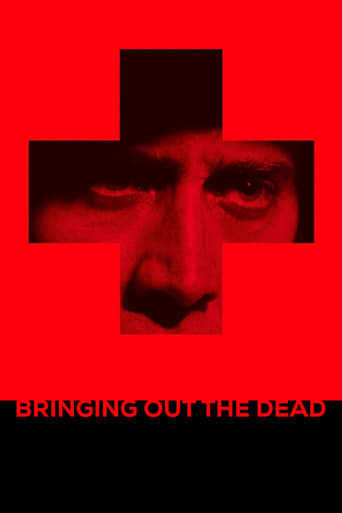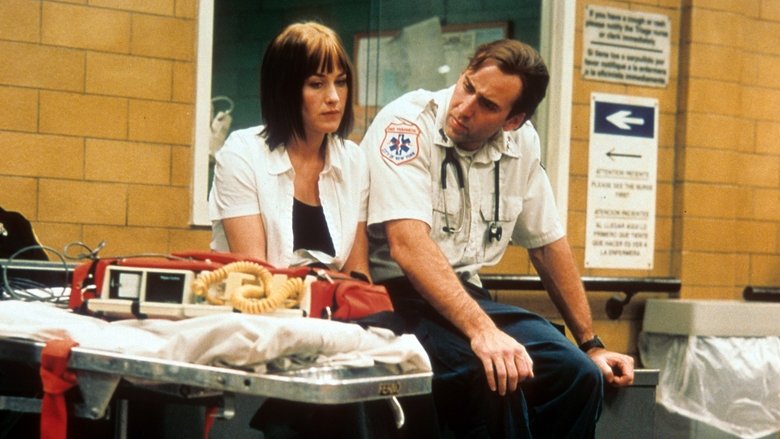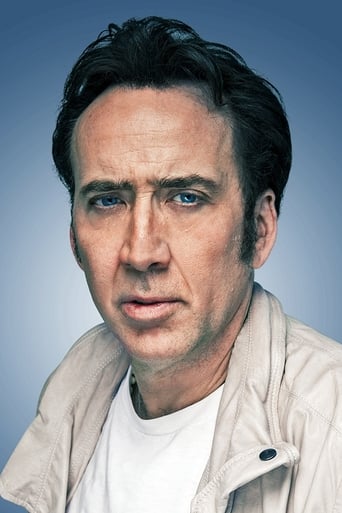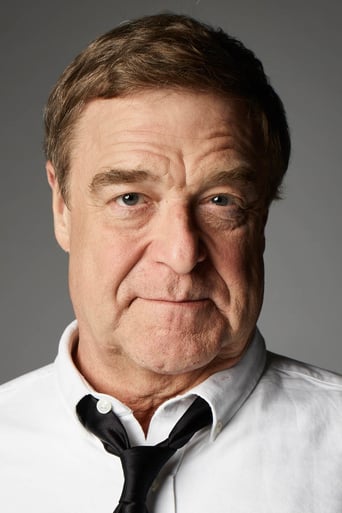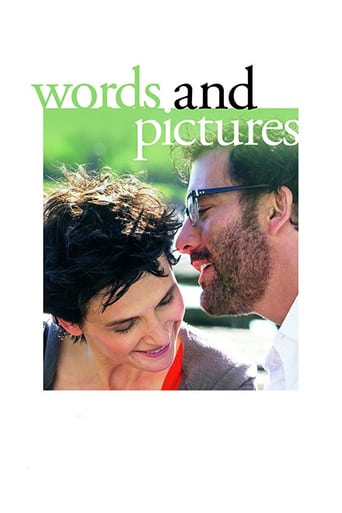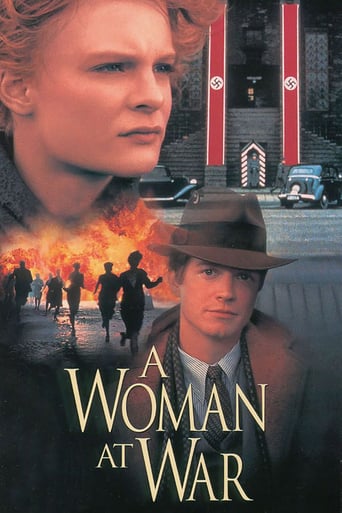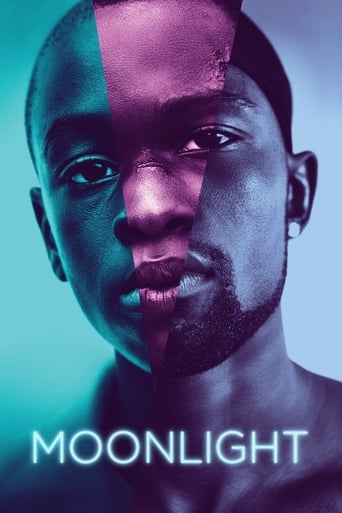Bringing Out the Dead (1999)
Once called "Father Frank" for his efforts to rescue lives, Frank Pierce sees the ghosts of those he failed to save around every turn. He has tried everything he can to get fired, calling in sick, delaying taking calls where he might have to face one more victim he couldn't help, yet cannot quit the job on his own.
Watch Trailer
Cast


Similar titles
Reviews
The best way to describe this film is the bleak tone of the general story. The whole atmosphere is rather depressing, but its necessary for this genre. Starring a cast which includes Nicolas Cage, Patricia Arquette, John Goodman, ,Ving Rhames, Tom Sizemore, and Marc Anthony, one can only help but be in awe at the hauntibg message in this work of art. Some people may feel the film drags on, and yes some parts are rather unnecessary, though this does help us understand the characters clearly. Next to his Oscar Winning in Leaving La, this is Cage's finest work. It is also one of the more underrated films from the long list of pictures directed by Martin Scorsese. This film definitely has strong parallels to the 1976 classic Taxi Driver, though this has a larger psychological focus. Filled with great performances and sharp dialogue this is a must see, especially for Cage/Scorsese fans.
Bringing Out the Dead is a film directed by Martin Scorsese.It stars Nicolas Cage, Ving Rhames, John Goodman, Tom Sizemore and Patricia Arquette.It tells a story of Frank Pierce,a paramedic on the brink of physical and emotional collapse.The screenplay was written by Paul Schrader and it was based from the novel of Joe Connelly.It is about 48 hours in the life of a burnt-out paramedic: Frank Pierce is a Manhattan medic,working the graveyard shift in a two-man ambulance team. He's burned out,exhausted, and seeing ghosts, especially a young woman he failed to save six months before. He is no longer able to save people as he simply brings out the dead. We follow him for three nights, each with a different partner: Larry, who thinks about dinner; Marcus, who looks to Jesus; and Tom, who wallops people out of frustration. Frank befriends Mary,the daughter of a heart victim he brings in. She is an ex-junkie, angry at her father but now hoping he'll live.Once called Father Frank for his efforts to rescue lives,he sees the ghosts of those he failed to save around every turn. He has tried everything he can to get fired-calling in sick, coming in late, delaying taking calls where he might have to face one more victim he can't help- yet he cannot quit the job.This is another Scorsese film achievement as he brings to the screen the life lived by people in the health care profession particularly the paramedics.It was definitely a dark and compelling film. Cage brings to life excellently a paramedic who has somewhat lost hope in his profession to save people from dying.Aside from Cage,the rest of the cast and the film makers are also commendable to bring to life this realistic and brilliant film.I myself could relate to the emotions of Frank and the disturbing experience watching it being a in the health care profession myself.In summary,Cage,Scorsese and Bringing Out The Dead delivers!!!
Okay, that may be too harsh, as I've seen a lot of truly terrible films at film festivals, but this has spoiled me on Scorcese -- making me wonder if he's actually got talent, or just makes films with violence and top-notch crew and scripts, so that it comes together. Is he just a guy who made two films that established him as a "visionary" in people's minds, so that he gets tons of top talent joining with him, the best scripts, etc. This film made this questions come to the forefront, because this seems truly to be his "vision" also -- and it's not a good picture. Shots are not artistic; editing is clunky; direction of actors is clumsy; story has no direction or emotional investment. I really don't think this is worth the couple hours out of your life.
After a decade of misdirection ('The Age of Innocence', 'Casino', 'Kundun') Martin Scorsese is back where he belongs, beating a welcome retreat to the mean streets of Manhattan for what many aficionados might consider to be an unofficial sequel (although it's more like a matching bookend) to his nightmare 1976 classic 'Taxi Driver'.Such will likely be the prevailing opinion, at any rate. It's hard enough these days for a halfway challenging movie to win an audience on its own merits, without adding the extra burden of unrealistic expectations. But because of its credentials Bringing Out the Dead will have to withstand a lot of inevitable (and unfair) comparisons to the earlier film, with which it shares the same grim setting and similar themes of alienation and redemption.Hardly surprising, since both were written by Paul Schrader, who knows every contour of this ambiguous moral territory like the back of his own hand. Only the presence of Robert DeNiro (or at least Harvey Keitel) would have made the reunion complete, but Scorsese wisely agreed to the casting of Nicholas Cage in the lead role, as a burned-out paramedic working the graveyard shift in that mid-town neighborhood west of Times Square known (for good reason) as Hell's Kitchen.Cage is in a slump: he's working too much, sleeping too little, and hasn't saved a life in months, not a healthy situation for someone who lives and (mostly) dies vicariously through his rescue efforts. Too many unresolved medical emergencies in the lunatic underbelly of Manhattan have brought him to a point where the only hold on his sanity is the paramedic's creed, usually applied to his patients: "keep the body going until the brain and heart recover".It's the pivotal message of the movie (and easy to spot because it's repeated twice), giving Cage's efforts to preserve his own battered psyche an irresistible, sometimes reckless momentum. The episodic storyline, adapted from the debut novel by Joe Connelly (an erstwhile paramedic himself) may not appeal to the average multiplex audience, conditioned to expect a more conventional, plot-driven narrative. But viewers who don't subscribe to the sales pitch ethos at large in modern Hollywood will find much to admire in Cage's not entirely successful struggle over a long, chaotic "weekend of full moons" to navigate the grief and accumulated guilt of too many flatliners.Not an easy task, as it turns out, especially in such a merciless environment. "This city will kill you if you're not strong enough", he's reminded at one point by Patricia Arquette, playing the long-suffering daughter of a brain-dead heart attack victim, and representing a token ray of slightly tarnished sunlight in an otherwise gloomy all-male scenario. It's the second key line of dialogue in the movie: a Nietzschean paraphrase no doubt endorsed by Scorsese himself, who (not for the first time) paints an all too vivid portrait of New York City not likely to be applauded by the local chamber of commerce.An introductory title places the action in the specific time frame of the early 1990s, before the PR mouseketeers of the Walt Disney Company ('Team Rodent', in Carl Hiaasen's memorable words) began their crusade to make the city safe for family tourism. This is the Big Apple before its corporate facelift: a loser's paradise of low-rent sleaze emporiums and wasted lives. Every other scene leaves an indelible (if not entirely accurate) impression of being set at the top of another inner-city tenement building, surrounded by a (mostly) nocturnal landscape littered with human flotsam: junkies, whores, hustlers, alcoholics, homeless bums and other assorted crazies, not least among them the paramedic crews themselves.Over the course of his dreamlike but sleepless 48-hour flight from reality Cage will find himself paired with a series of increasingly eccentric partners, from a jovial John Goodman to Ving Rhames to a truly psychotic Tom Sizemore. You'll find a measure of more or less traditional buddy-film banter while each team is on the streets, but don't expect too many comfortable chuckles. Scorsese has a gift for raising uneasy laughter from even the darkest scenario, and like all his best films the humor in Bringing Out the Dead is colored in shades of midnight gray, suitably morbid but still amusing if approached in the proper twisted spirit.Sharing equal screen time with a trio of certifies scene-stealers must have posed a particular challenge for Cage, normally an unrestrained actor of no small notoriety. He has been known to run amok over weaker material "like a narcoleptic bull in a cheap china shop" (quoting an acerbic review of his jaw-dropping hambone turn in the 1989 film 'Vampire's Kiss'), but it's a credit to Scorsese's skill that he manages to coax his star into a performance of laudable restraint and understatement. There's more than a little evidence of method acting residue at work: it looks as if Cage prepared for his insomniac role by depriving himself of sleep for several weeks, giving his complexion a totally convincing night owl pallor, strikingly highlighted by Robert Richardson's luminous cinematography.In the spirit of the times the film outstays its welcome by a good twenty minutes, a familiar complaint in these days of slack-fingered editing and narrative hypertrophy. But after its headlong rush into the urban maelstrom of inner Manhattan the story manages to resolve itself on a note of unexpected grace. If the aim was simply to recapture the flavor of Taxi Driver, it might have ended in a cathartic bloodbath worthy of Travis Bickle, instead of with the quieter (but no less powerful) epiphany shown here.So maybe it's true, at least for the maverick directors of the 1970s: you can't go home again. And on the evidence presented here, that's something to be thankful for.

